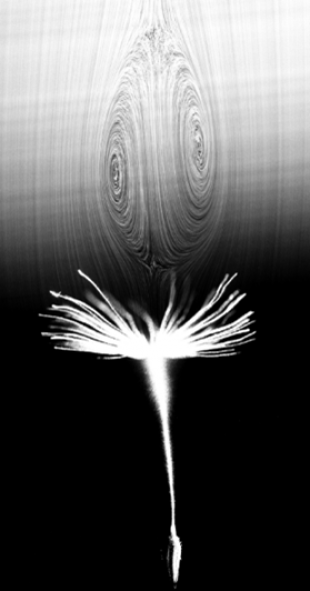In the next decade, distributed sensor network systems made of small flying sensors, from dust-scale to insect-scale, will enable a step change in monitoring natural disasters and remote areas. They will contribute to protecting the environment by providing data on the contamination of physical and biological systems and the impact of human activities. To date, a key limitation of this technology is that small sensors can remain airborne only for a few tens of minutes.
By contrast, some natural flyers, such as the dandelion fruit, travel unpowered for days and hundreds of kilometres. Recent Edinburgh research revealed the aerodynamics underlying the extraordinary flight ability of the dandelion, including the energy scavenging mechanisms that allow it to regain altitude at every wind gust. The present project aims to exploit these aerodynamic findings to enable a step change in the endurance and range of flying sensors. The candidate will design and test an ultra-light (c.a. 1 mg) insect-scale bioresorbable flyer with sensing and communication capabilities in a bespoke wind tunnel.
The successful applicant will work in an Edinburgh team of about ten researchers, including PhD students, postdoctoral research associates, and technicians. These researchers contribute to the design of this novel technology through numerical simulations, experiments, and theoretical model development. The Edinburgh team also collaborates closely with several overseas research leaders who undertake complementary projects and advise on the team's activities.
Successful applicants should have a bachelor’s degree in engineering or equivalent experience and be passionate about microtechnology and robotics, or aerodynamics; the project will be tailored to the specific field of interest of the student.
The position will remain open until a successful applicant is identified. For informal enquiries, please email Dr Jawahar Sivabharathy Samuthira Pandi, jsamuthi@ed.ac.uk. We aim to reply to all informal enquiries within 10 working days.
Further Information:
The University of Edinburgh is committed to equality of opportunity for all its staff and students, and promotes a culture of inclusivity. Please see details here: https://www.ed.ac.uk/equality-diversity
Closing Date:
Principal Supervisor:
Eligibility:
Minimum entry qualification - an Honours degree at 2:1 or above (or International equivalent) in a relevant science or engineering discipline, possibly supported by an MSc Degree. Further information on English language requirements for EU/Overseas applicants.
Funding:
Tuition fees and stipends are available for both Home and International students. For more information, visit https://voilab.eng.ed.ac.uk/phd.




